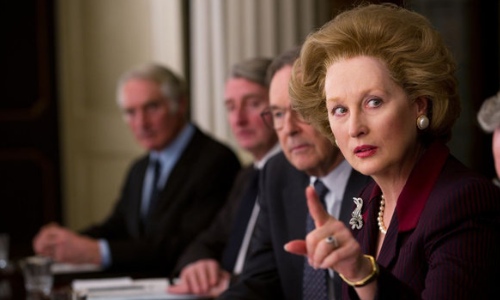Review: The Iron Lady

She’s one of the defining figures of our generation; a woman who reached the top despite the best efforts of the patriarchy; a divisive personality who demands the grudging respect of her detractors. You have to love Meryl Streep.
And in The Iron Lady – a flawed, at times flimsy film – she delivers the performance of her career.
The opening sequence shows a frail Margaret Thatcher wandering into a corner shop, where the music is too loud and a local youth, blissfully unaware of who she is, shoulders past her. The price of milk – which the grocer’s daughter could once quote on demand – astonishes her. The film may be titled the The Iron Lady, but it is the Old Lady who takes centre stage – a woman lost in the world she helped to create: lonely, confused, plagued by the onset of dementia and unable to recover from the death of her husband.
Dennis Thatcher’s ghost, camped up by Jim Broadbent, is a recurring character, keeping the former Prime Minister company as she whiles away her days, effectively under house arrest. His presence is a neat, if slightly uncomfortable, trick, providing both light relief and a stark reminder of the tribulations of old age.
This is where The Iron Lady is at its best, showing a side of Thatcher hitherto unexplored on film, struggling to come to terms with life after power.
The rest of the film, told through prolonged flashbacks brought on by current events (a news report of a terrorist attack brings back harrowing memories of the IRA’s Brighton bombing), plays like a highlights reel of Thatcher’s life – the sort of thing you would expect to see in an obituary. Her famous Finchley victory, the miners strikes, the Falklands conflict, Brighton: these milestones are all skillfully re-enacted, with painstaking attention to detail but there is little offered to explain the psychological impetus or wider political backdrop.
The young Thatcher – played by Alexandra Roach, who never quite hits the highs of Andrea Riseborough in The Long Walk to Finchley – is plucky, rising to the top despite being shunned by the boys-club at Westminster; a blue hat in a sea a black suits. During one Commons clash she is sneeringly told to “calm down,” a knowing nod to modern politics that, sadly, The Iron Lady strictly rations. But her rise to power feels toothless – she succeeds entirely through being earnest: the shrewd, formidable political operator in her is ignored.
The “grocer’s daughter” cliche is reeled out so often The Iron Lady feels one dimensional. Even her heavy-handed treatment of her cabinet is pitted as the struggle of a single-minded woman swimming against the current, engaged in a ceaseless war with the spineless, treacherous men surrounding her.
This is partly down to Streep, who, clearly fond of the woman she is playing, imbues even Thatcher’s dark moments with dignity. Peel back the fluffy retelling (which is perhaps not entirely surprising, considering director Phyllida Lloyd’s last movie was Mamma Mia!) and you’re left with a stand-out performance by Streep. She captures Thatcher eerily well – the 1,000-yard stare, the walk and most of all the voice. She mimics her unmistakable tenor like a mynah bird with a blow-dry. The scenes in Thatcher’s home, where her loneliness and mental decline are laid bare, prompted audible sniffles from a theatre full of hard-nosed political hacks.
The supporting cast – including Richard E Grant as Michael Heseltine and, notably, Peep Show’s Olivia Colman as daughter Carol – are solid but pale alongside their leading lady.
For intellectual vigour or political cut and thrust, look elsewhere. This is a virtuoso tour of Number 10 Downing Streep. That third Oscar could be close.
First published in City A.M.

